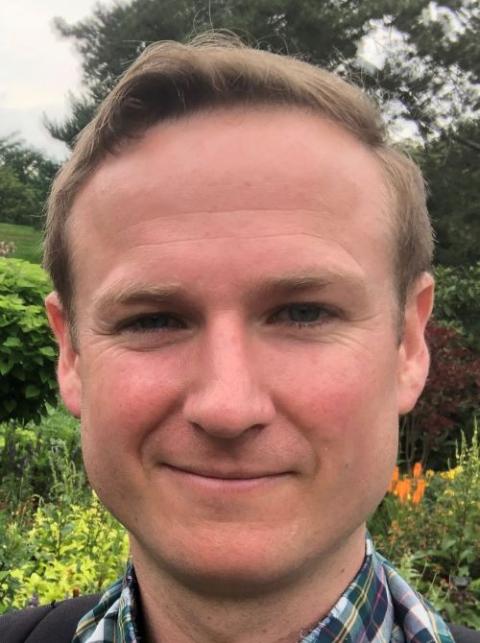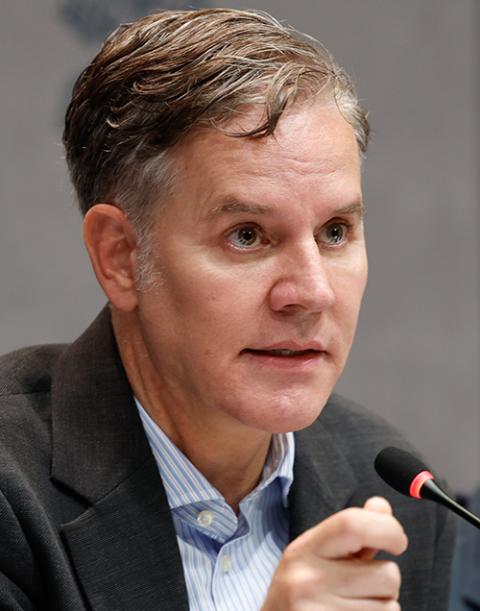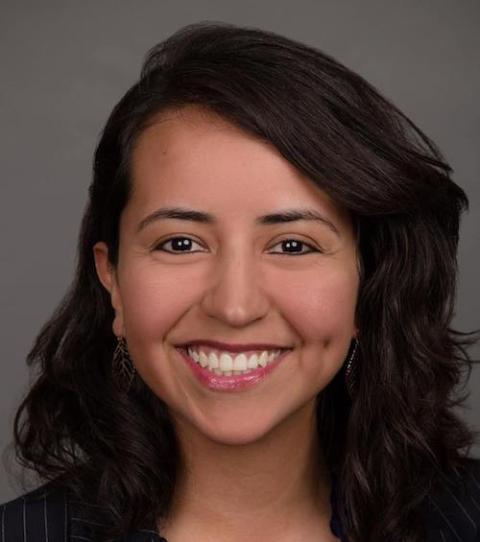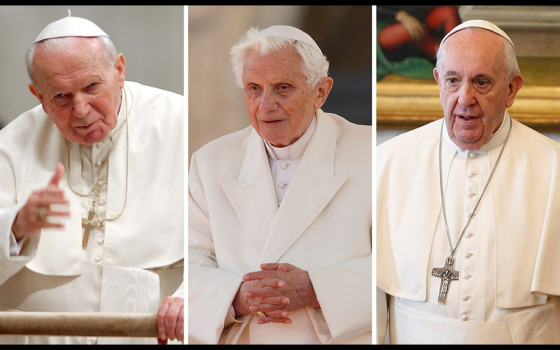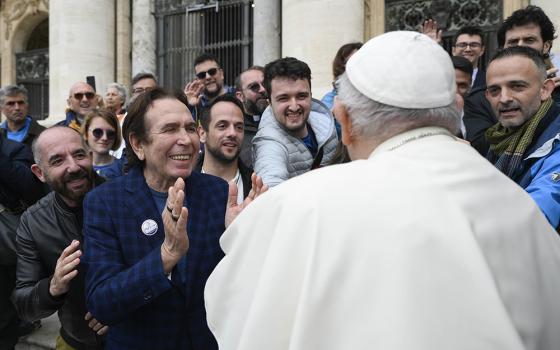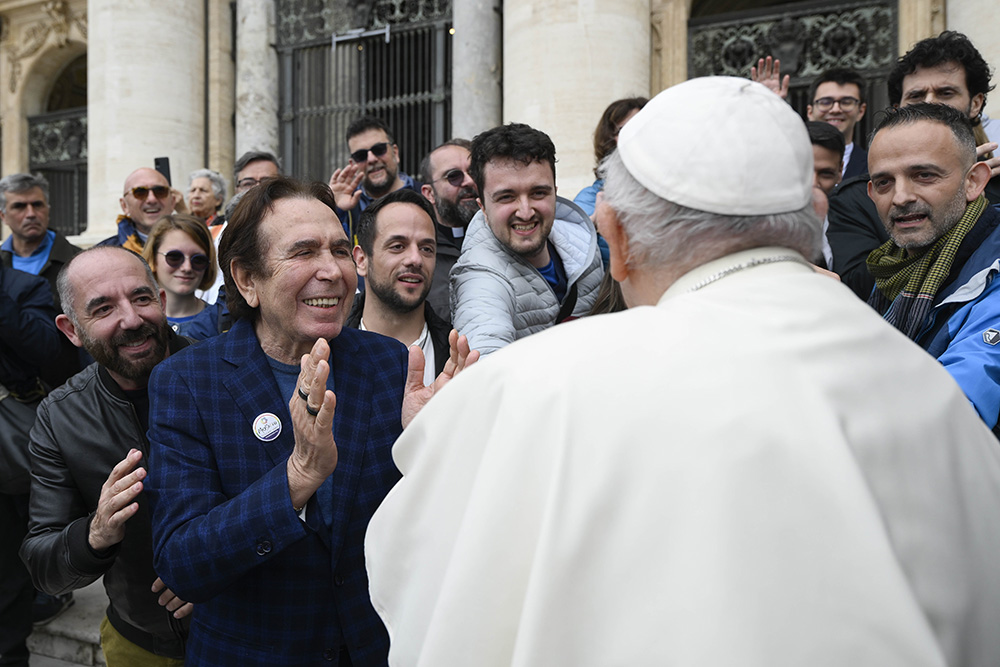
Pope Francis greets members of Mosaiko, a Rome organization for LGBT Christians, at the end of his weekly general audience in St. Peter's Square at the Vatican May 17, 2023. (CNS/Vatican Media)
Michael Sennett, age 8 and preparing for his first Communion, was told by a priest he must stop pretending to be a boy and that his desire to wear a suit for the sacrament was sinful. In fact, it was a straight shot to hell.
Twenty years later, on a fall afternoon in Rome, Pope Francis hugged Sennett in his private residence. The pope leaned in to listen as the young Catholic described the benefits of gender-affirming medical treatments, grasping his pectoral cross with emotion when Sennett recalled his pre-transition suicide attempt.
"Some say he did not do enough; others criticize him for even meeting with people like me, transgender people," Sennett said. "But he led by example. And in doing so he brought more hope, more love to the Catholic Church — and to my life."
Francis, who died on April 21, addressed LGBTQ issues in a manner that rattled many traditional Catholics and raised the expectations of progressives. From his high-profile friendships with LGBTQ people and widely publicized "Who am I to judge?" comment, to his repeated admonishment of "gender ideology" and use of a homophobic slur, the pontiff's actions were, according to Catholic LGBTQ advocates, by turns confounding, harmful, complex and transformative.
Ultimately the pope's posture of openness and empathy toward the LGBTQ community — exemplified in the moments, both public and private, he shared with individuals such as Sennett — will be among the most significant legacies of his 12-year pontificate.
"Pope Francis did more for LGBTQ Catholics than all of his predecessors combined," said Jesuit Fr. James Martin, a prominent advocate for greater LGBTQ inclusion in the church. "Doctrinally nothing has changed, but pastorally a great deal has."
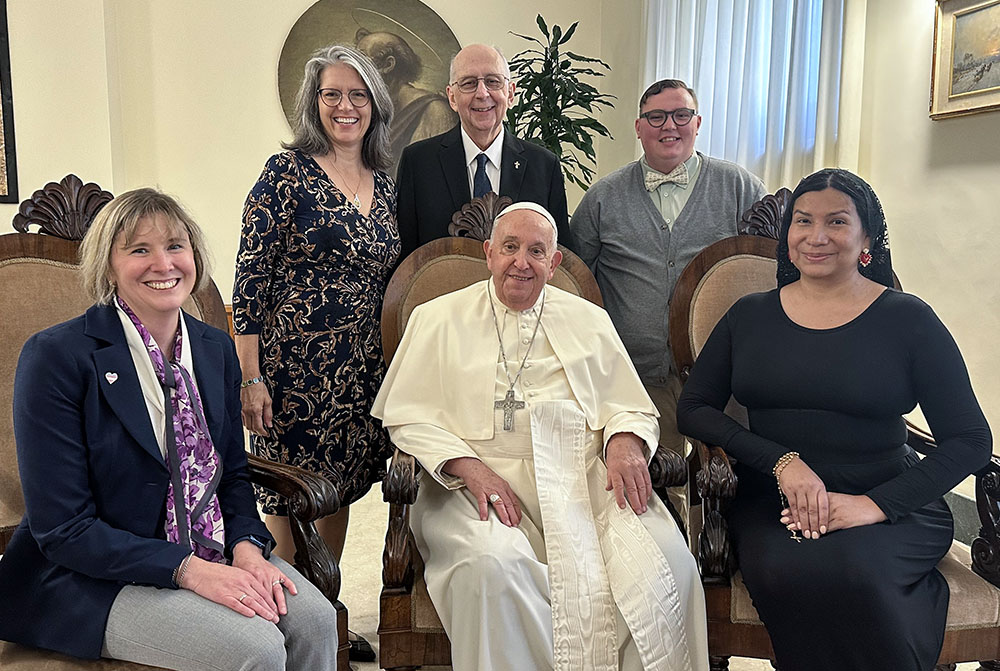
Pope Francis poses for a photo with a delegation from New Ways Ministry during a meeting at his residence at the Vatican Oct. 12, 2024. Pictured from left are Cynthia Herrick, Laurie Dever, Deacon Ray Dever, Michael Sennett and Nicole Santamaria. (CNS/Courtesy of New Ways Ministry)
'A symbol of hope'
The world awakened to Francis' pastoral approach to LGBTQ people four months into his papacy, when a journalist asked him a question about gay priests and he answered: "If someone is gay and he searches for the Lord and has goodwill, who am I to judge?"
That reply, while not contradicting church teaching, "put the Catholic Church on a very different trajectory with LGBTQ issues," said Fr. Bryan Massingale, a gay man and theologian at Fordham University in New York.
The trajectory emphasized mercy rather than moral judgments. In his first year, Francis criticized the church for being "obsessed" with issues such as abortion, contraception and gay marriage, and throughout his tenure he underscored the institution's disapproval of them less than his predecessors Popes Benedict XVI and John Paul II.
"What I don't like at all, in general, is that we look at the so-called 'sin of the flesh' with a magnifying glass," Francis cautioned fellow Jesuits in 2023. "If you exploited workers, if you lied or cheated, it didn't matter, and instead relevant were the sins below the waist."
The earliest harbinger of a pontificate attentive to marginalized communities, however, occurred right after his election, when Jorge Bergoglio stepped onto the Vatican balcony as "Francis" and became the first pope to take the name honoring St. Francis of Assisi — a friar revered for his care of the poor and outcast.
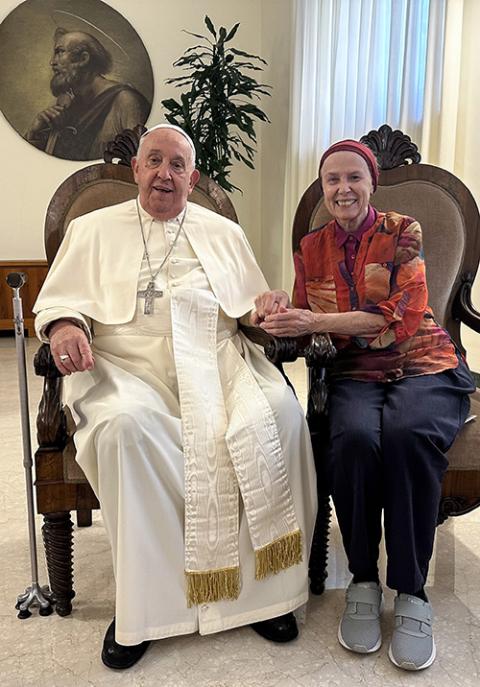
Pope Francis poses for a photo with Loretto Sr. Jeannine Gramick during a meeting with a delegation from New Ways Ministry at his residence at the Vatican Oct. 12, 2024. (CNS/Courtesy of New Ways Ministry)
"His concern for those on the margins, as well as his humility, shone through right from the start," said Loretto Sr. Jeannine Gramick, co-founder of the LGBTQ Catholic advocacy group New Ways Ministry, based in suburban Washington, D.C.
In the final years of his papacy, the relationship between the American religious sister and the pontiff was emblematic of the striking changes that occurred under him.
On Oct. 1, 1986, Cardinal Joseph Ratzinger, head of the Vatican's doctrinal office and the future Pope Benedict XVI, signed what would later be known by activists as the "Halloween letter." The document on "the pastoral care of homosexual persons" said that to have a homosexual inclination itself is not a sin but a "strong tendency ordered toward an intrinsic moral evil." Homosexual activity is "essentially self-indulgent," it read.
In the wake of the letter, DignityUSA, one of the oldest Catholic LGBTQ ministries, was banned from meeting in many Catholic spaces, and numerous LGBTQ individuals left the church, according to Marianne Duddy-Burke, longtime leader of DignityUSA.
About a decade later, the Vatican's doctrine office, still headed by Ratzinger, declared that Gramick and her fellow New Ways Ministry founder, Salvatoran Fr. Robert Nugent, must halt their ministry work due to the "harmful confusion" it caused. In 2010 and 2011, officials of the U.S. bishops' conference censured New Ways for its support of civil marriage for same-sex couples.
But in 2021, Gramick and Francis DeBernardo, executive director of New Ways Ministry, decided to write to the pope and share the history of their outreach. They'd observed the changes since his election and knew that as archbishop of Buenos Aires, Argentina, he had also supported civil unions for homosexual people.
Francis not only wrote back; he encouraged their work.
"We were ecstatic," recalled Gramick, who developed an ongoing correspondence with the pontiff.
Francis' connections with Gramick, Martin and others instigated greater freedom and energy for LGBTQ Catholic outreach, said Jason Steidl Jack, a gay Catholic and assistant teaching professor of religious studies at St. Joseph's University in New York.
"His support for their work trickled down to folks like me," said Steidl Jack, who also serves in LGBTQ ministry.
Francis appointed an openly gay man, Juan Carlos Cruz Chellew, a Chilean-born abuse survivor and whistleblower, to the Pontifical Commission for the Protection of Minors, a key post. Several years prior, Cruz said the pope had told him, "God made you like this and he loves you."
"My friendship with Pope Francis is not just a personal bond, but also a symbol of hope for many," Cruz said during a 2023 conference for LGBTQ Catholics. "It shows that the divide between faith and sexuality can be bridged."
Groups that had once uninvited Gramick reinvited her under Francis, and LGBTQ ministries in parishes, school and religious congregations grew, said DeBernardo.
"There has been an incredible desire to include LGBTQ people in the church, but there's been an incredible fear on the part of pastoral workers," DeBernardo said. "Francis erased that fear and gave people courage."
In 2023, Francis became the first pope to officially back the repeal of legislation criminalizing homosexuality. More than 60 countries criminalize same-sex activity; the death penalty is the punishment in a dozen jurisdictions.
Being homosexual is "not a crime," Francis told the Associated Press. Homosexual sexual relations are a sin, he said, but "let's distinguish between a sin and a crime."
Francis was also the first pope to use the word "gay" rather than speak of people who experience "same-sex attraction," the term used in the catechism. During his papacy, the Vatican began using the "LGBT" acronym.
The synod on synodality, a three-year, worldwide consultation on the future of the Catholic Church and a signature project of Francis' tenure, brought LGBTQ-related concerns to the highest levels of discussion at the Vatican.
Although the final synod document did not mention LGBTQ people, "the conversation that began at the synod cannot be undone," said Sr. Luisa Derouen, a Dominican Sister of Peace who has ministered among the transgender community for decades. "The bishops now know people from all over the world are declaring that the Catholic Church needs to be a more welcoming place for the LGBTQ community."
Parish ministers told NCR many young people remained in the church because of the new sense of inclusiveness.
The pope helped young people see the church as a force for justice, said Yunuen Trujillo, a community organizer and immigration attorney in Los Angeles who's worked in young adult and LGBTQ Catholic ministries. "He was a breath of fresh air for young people."
Throughout his papacy, Francis appointed several U.S. bishops who have taken a progressive stance on LGBTQ issues, notably sending Cardinal Robert McElroy to head the Archdiocese of Washington, D.C.
Francis received abundant pushback to his priorities during his pontificate. In the United States, such resistance was particularly around combating climate change and welcoming LGBTQ people. Two years before his death, the pope rebuked what he said were groups of "very strong, reactionary" American Catholics and warned against "backwardists."
A place for transgender Catholics?
Tension between church doctrine — as well as Francis' own words — and the pope's pastoral actions was nowhere more evident than on issues of gender identity.
The pope regularly met with transgender individuals, including contingents from the United States. And in the fall of 2023, the Vatican's doctrinal office released a document stating transgender people can be baptized as Catholics and serve as godparents, as long as the situation does not "cause scandal."
According to Gramick and Sennett, both part of a delegation who visited the pope in 2024, Francis shared that one of the questions he considers when appointing bishops is if they are supportive of transgender people.
But Francis also frequently assailed so-called gender ideology "as the ugliest danger," and his words and Vatican documents helped embolden U.S. bishops to create controversial policies focused on gender identity, ban gender-affirming care at Catholic hospitals, and support legislation curtailing such care for minors.
"Gender ideology" has never been officially defined, said Massingale, but the best way to understand it is that the church under Francis "has continued to privilege a binary understanding of human sexuality, that people are either male or female."
Advertisement
In April 2024, the Vatican's doctrine office published "Dignitas Infinita: on Human Dignity," which repeats Francis' condemnation of gender ideology and classifies gender-affirming care as a grave violation of human dignity.
It was the clearest doctrinal denunciation of gender-affirming medical interventions to date, though the phrasing seems to leave a small opening for exceptions.
Bishop Robert Barron, chairman of the U.S. bishops' Committee on Laity, Marriage, Family Life, and Youth, quoted Dignitas Infinita to praise Trump's executive order directing agencies to limit youth access to gender-affirming care (the order contains misinformation about such care and trans youths). The U.S. bishops also cited Dignitas Infinita in a 2024 amicus brief for a key case on transgender minors pending in the Supreme Court.
Many trans people who respect Pope Francis "were thrown into an abyss of despair" after reading Dignitas Infinita, said Gramick, who shared her alarm with Francis in one of her letters.
In his response, the pontiff described gender ideology as a view that "nullifies differences" and "something other than" transgender individuals. "Transgender people must be accepted and integrated into society," he wrote.
Adding further nuance to Dignitas Infinita, Cardinal Victor Manuel Fernández, head of the Vatican's doctrine office, said in February 2025 that those who experience profound dysphoria "must be evaluated with great care."
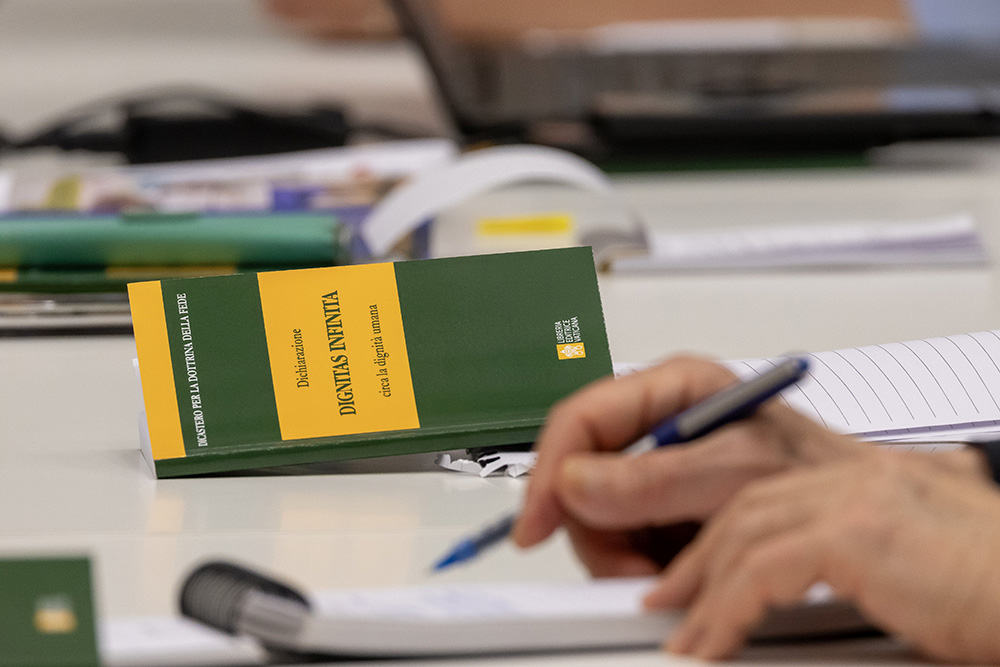
Cardinal Víctor Manuel Fernández, prefect of the Dicastery for the Doctrine of the Faith, takes notes during a news conference to present Dignitas Infinita, a copy of which is nearby, at the Vatican press office April 8, 2024. (CNS/Pablo Esparza)
"Pope Francis met with transgender people, was respectful of them and acknowledged them for who they are," said Massingale. "Going forward, I think the work will be how do we reconcile this deep compassion and sensitivity for people in the trans community, and also, what impact does that have upon our traditional beliefs and practices? I think that's the ongoing work that the pope is leaving the church to wrestle with."
'A giant baby step forward'
A week before Christmas in 2023, the Vatican caused a churchwide brouhaha when it released a text allowing priests to provide spontaneous blessings for individuals who are remarried or in same-sex unions. Reporters and church officials alike scrambled to understand the text: Was it a change in doctrine or a repackaging of pastoral practice?
In reality, what was new about Fiducia Supplicans was that it made a distinction between a ritual or liturgical blessing and an informal blessing. It did not change church teaching on matrimony but says people seeking God's mercy and love should not be subject to "an exhaustive moral analysis" as a precondition.
Backlash to the document was especially harsh in Eastern Europe and Africa. Fiducia Supplicans "never would have happened [under Benedict] because it was so ambiguous," Cardinal Gerhard Müller, the church's doctrinal chief under Benedict, told Reuters.
Many LGBTQ advocates, however, say the document is perhaps the most influential LGBTQ-related text issued under Francis. It was the first time the church explicitly allowed clergy to bless individuals in same-sex relationships, and it was the first time a Vatican document recognizes "some good in same-sex couples," said Martin.
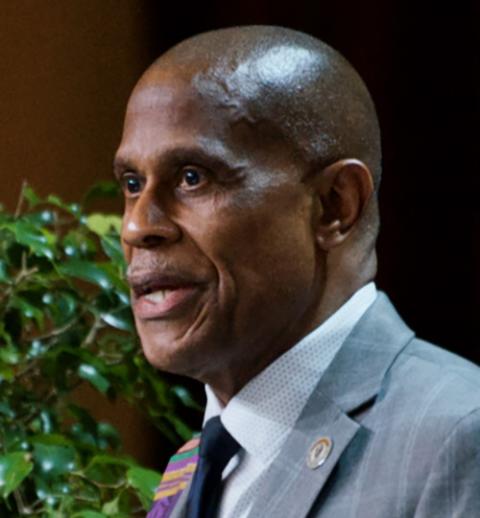
Fr. Bryan Massingale (GSR photo/Dan Stockman)
Massingale called Fiducia Supplicans "a giant baby step forward."
"It's a major step in terms of showing the Catholic Church desires to be a home for all LGBTQ people," he said. "But it is only a baby step because it comes with all these warnings, concerns and caveats, such as blessings can't take place in a liturgical rite."
Martin, whose ministry to LGBTQ Catholics was bolstered by the pope's support, recalled an incident that for him captures who Francis was as a human being — his humanness, integrity and humility.
In spring 2024, the pope, while reaffirming the church's prohibition on ordaining men with "deep-seated" homosexual tendencies, used a homophobic term when speaking with Italian bishops behind closed doors. The Vatican eventually issued an apology. (In early 2025, the Vatican approved new guidelines from the Italian bishops allowing gay men to enter seminaries.)
Martin met with the pope soon after his use of the slur, and they had what the American priest described as a "blunt" conversation.
A few days later, the priest interacted with Francis again at an event for comedians that Martin had helped organize.
"After some joking, he said to me, 'Thank you for that conversation the other day. I needed to hear that.'
"I thought, 'Who thanks people for a difficult conversation?' " said Martin. "The answer: a man like Francis, who is humble enough to listen even to critiques."
This example, Martin said, shows "the kind of man he was."
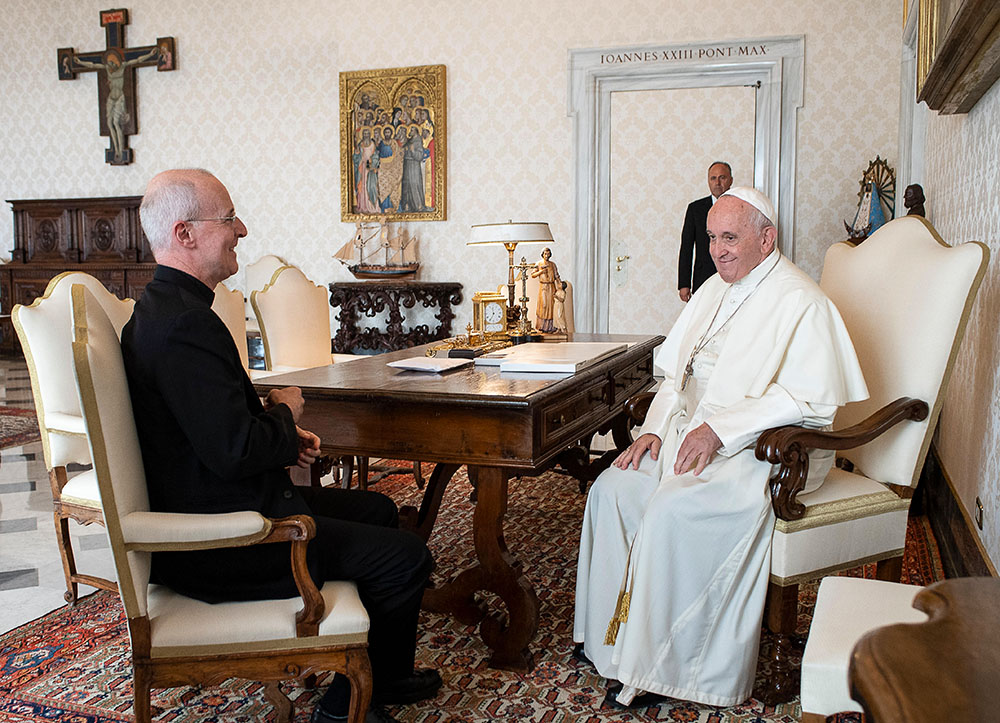
Pope Francis smiles during a private meeting with Jesuit Fr. James Martin at the Vatican Oct. 1, 2019. (CNS/Vatican Media)
An ally and a friend
What Francis has done is more fundamental than changing church teaching, said Derouen, the religious sister who ministers among trans people.
He has changed "the disposition, the posture that we have toward each other as the body of Christ," she said. Francis insisted "that we start with the person before us — real people — and not academic doctrine. I think that can't help but eventually lead to changes in church teaching, because that is precisely how doctrine develops."
The process begins, said Derouen, when the "lived experience of the people of God no longer adequately reflects what the church teaches."
The church is at a crossroads, said Massingale. "I think the question that Pope Francis has placed before the church is this: Are gay, lesbian, bisexual, trans and queer Catholics equally members of the body of Christ or not? And I think Pope Francis has tried to move the Catholic Church to a stance of affirmation, because I think that's the only place that authentic Christianity can lead us."
If future popes do not build on these overtures, "then I fear many in the Catholic Church, especially in the LGBTQ community, will walk away," said Massingale.
Martin said he believes Francis' legacy is one of opening a door to a group who had sometimes felt "completely shut out of what is, after all, their church too."
"Mainly what will endure," he said, is Francis' "pastoral heart toward this community, who considered him a friend and ally."
Sennett, the trans man who met the pope last year, said he will carry the grace of the visit with him for the rest of his life.
"I hope to hold it within me," he said, "and share it, as best I can, with each person I encounter."

